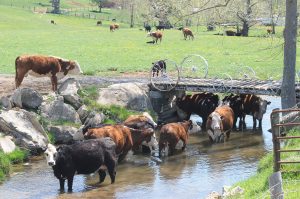
Drop in Rainfall in 2019 May Be Responsible for Less Manure Runoff
Washington, D.C. – Water testing in the Shenandoah Valley’s waterways has found 75 percent of locations with too much fecal bacteria for safe water-contact recreation so far in 2019, a slight improvement from the 81 percent last year, according to a new online database compiled by the Environmental Integrity Project (EIP).
To see which locations in the valley had high levels of E coli bacteria, visit EIP’s new online data map here.
Runoff of manure from the Shenandoah’s livestock industry contributes to the high bacteria and nutrient levels in the waterways, and a 2018 report from the Environmental Integrity Project documented that only about 20 percent of farmers fence their cattle out of streams and rivers in the valley’s two biggest agricultural counties, Augusta and Rockingham. Other sources, including wildlife, urban runoff, and sewage plant effluent, also contribute to the problem.
“Because the Shenandoah is so important to Virginia’s outdoor recreation industry and culture, we urge the Commonwealth to require farmers to keep cattle out of the waterways and do more to help livestock owners pay for streamside fences and other practices to protect water quality,” said Courtney Bernhardt, Director of Research for the Environmental Integrity Project.
“In the meantime, Virginia should start notifying residents which waterways have too much fecal bacteria for safe water-contact recreation, because right now there is not enough information available for the public on the subject,” said Bernhardt.
Data collected by the Virginia Department of Environmental Quality (VDEQ) and the National Oceanic and Atmospheric Administration suggest that bacteria levels in the Shenandoah’s waterways tend to be higher in years with more precipitation, as more rain washes more sediment and fertilizer off the land.
Last year, a larger than usual amount of rainfall was recorded in Harrisonburg, Virginia (almost 60 inches), as well as elsewhere in the region. Water testing by VDEQ in 2018 found 81 percent of sampling locations in the valley’s waterways (55 of 68) had levels of E coli that would be unhealthy for swimming or water-contact recreation.
Through September of this year, significantly less rain has fallen (31 inches), and testing showed lower levels of bacteria, with 75 percent of water sampling locations (24 of 32) showing unhealthy levels of E coli.
Below is a chart of annual bacteria levels since 2014 in Shenandoah waterways:
| Year | Number of Sites Sampled* | Number of Sites Where Bacteria Exceeded Recreational Standard** | Percent of Sites Unsafe for Swimming or Contact Recreation |
| 2014 | 78 | 49 | 63% |
| 2015 | 69 | 59 | 86% |
| 2016 | 73 | 50 | 68% |
| 2017 | 65 | 40 | 62% |
| 2018 | 68 | 55 | 81% |
| 2019*** | 32 | 24 | 75% |
Source: Virginia Department of Environmental Quality. * The water sampling locations monitored by VDEQ change from year to year, making exact comparisons difficult. ** The state’s health standard for water contact recreation in fresh water is 235 CFU or MPN/100mL at least 10% of the time. *** 2019 figure is for January-September of this year.
For more information, and a detailed map showing all of the sampling locations and results, visit: www.environmentalintegrity.org/shenandoah-valley-bacteria/
An Environmental Integrity Project report from 2017 recommended that Virginia take several steps to reduce agricultural pollution in the Shenandoah, including establishing a better system for collecting and disposing of surplus livestock manure; requiring fertilizer management plans for all farms that spread manure; increasing inspections and enforcement; and requiring all farmers to fence their cattle out of public waterways.
The Environmental Integrity Project is a nonprofit, nonpartisan organization based in Washington, D.C., and Austin, Texas, that protects public health and the environment by investigating polluters, holding them accountable under the law, and strengthening public policy.
Media contact: Tom Pelton, Environmental Integrity Project (443) 510-2574


